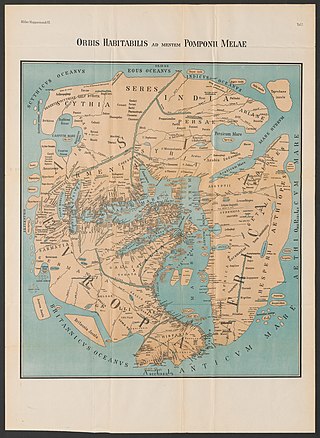Related Research Articles

Pomponius Mela, who wrote around AD 43, was the earliest known Roman geographer. He was born in Tingentera and died c. AD 45.
Gaius Trebatius Testa was a jurist of ancient Rome, whose family, and himself, originated from Elea.
Marcus Porcius Cato Licinianus was son of Cato the Elder by his first wife Licinia, and thence called Licinianus, to distinguish him from his half-brother, Marcus Salonianus, the son of Salonia. He was distinguished as a jurist.
Julius Paulus, often simply referred to as Paul in English, was one of the most influential and distinguished Roman jurists. He was also a praetorian prefect under the Roman Emperor Alexander Severus.

Lucius Octavius Cornelius Publius Salvius Iulianus Aemilianus, generally referred to as Salvius Julianus, or Julian the Jurist, or simply Julianus, was a well known and respected jurist, public official, and politician who served in the Roman imperial state. Of north African origin, he was active during the long reigns of the emperors Hadrian, Antoninus Pius, and Marcus Aurelius, as well as the shorter reign of Marcus Aurelius' first co-Emperor, Lucius Verus.
Pacuvius Labeo was a Roman jurist and senator, and one of the murderers of Julius Caesar. He was father of the more eminent jurist Marcus Antistius Labeo, who lived under the emperor Augustus.
Gaius Ateius Capito was a Roman jurist in the time of emperors Augustus and Tiberius. He was consul suffectus in the year 5 from July to December as the colleague of Gaius Vibius Postumus.
Aulus Ofilius was a Roman jurist of Equestrian rank, who lived in the Roman Republic. He is named as a jurist by Pomponius. Ofilius was a friend to Roman statesman Marcus Tullius Cicero, dictator Gaius Julius Caesar and in opinion had opposed the jurist Trebatius Testa.

The gens Antistia, sometimes written Antestia on coins, was a plebeian family at ancient Rome. The first of the gens to achieve prominence was Sextus Antistius, tribune of the plebs in 422 BC.
The gens Ateia was a plebeian family at Rome. The gens does not appear to have been particularly large or important, and is known from a small number of individuals, of whom the most illustrious was the jurist Gaius Ateius Capito, consul in AD 5.

The gens Pomponia was a plebeian family at ancient Rome. Its members appear throughout the history of the Roman Republic, and into imperial times. The first of the gens to achieve prominence was Marcus Pomponius, tribune of the plebs in 449 BC; the first who obtained the consulship was Manius Pomponius Matho in 233 BC.
The secespita is a long iron sacrificial knife, made of brass and copper from Cyprus, with a solid and rounded ivory handle, which is secured to the hilt by a ring of silver or gold. The flamens and their wives, the flaminicae, who were priests and priestesses of the Ancient Rome, the virgins and the pontiffs made use of it for sacrifices. This knife derives its name from the Latin verb seco.
Proculus was an ancient Roman jurist who founded a distinctive tradition of the interpretation of Roman law. His followers were known as the "Proculiani", or Proculeans, after him.
The gens Ofilia, also spelled Ofillia and Ofellia, was a plebeian family at ancient Rome. Its most illustrious member was the jurist Aulus Ofilius, a friend of both Caesar and Cicero.
The gens Pacuvia was a minor plebeian family at ancient Rome. Members of this gens are first mentioned during the second century BC, and from then down to the first century of the Empire Pacuvii are occasionally encountered in the historians. The first of the Pacuvii to achieve prominence at Rome, and certainly the most illustrious of the family, was the tragic poet Marcus Pacuvius.
Titius Aristo was a distinguished jurist of ancient Rome, who lived around the 1st and 2nd centuries CE, under the emperor Trajan, and was a friend of Pliny the Younger. He is spoken of by Pliny in terms of the highest praise, as not only an excellent man and profound scholar, but a lawyer thoroughly acquainted with private and public law, and perfectly skilled in the practice of his profession.
The Proculeian or Pegasian school was one of the two most important schools of law in ancient Rome during the 1st and 2nd centuries.
The gens Trebatia was a minor plebeian family at ancient Rome. Members of this gens are first mentioned at the time of the Social War, in which one of the Samnite generals was a Trebatius, but the best-known of the Trebatii is likely the jurist Gaius Trebatius Testa, a contemporary and friend of Cicero, Caesar, and Augustus.
References
- Johann Maier Eck, De vita, moribus, et studiis M. Ant. Labeonis (Franeker, 1692), in Oelrichss Thes. nov., vol. i.
- Johannes Jacobus Mascovius, De sectis Sabinianorum et Proculianorum (1728)
- Lothar Anton Alfred Pernice, Marcus Antistius Labeo. Das römische Privatrecht im 1. Jahrhundert der Kaiserzeit (Halle, 1873–1892)
- This article incorporates text from a publication now in the public domain : Chisholm, Hugh, ed. (1911). "Labeo, Marcus Antistius". Encyclopædia Britannica . Vol. 16 (11th ed.). Cambridge University Press. p. 3.